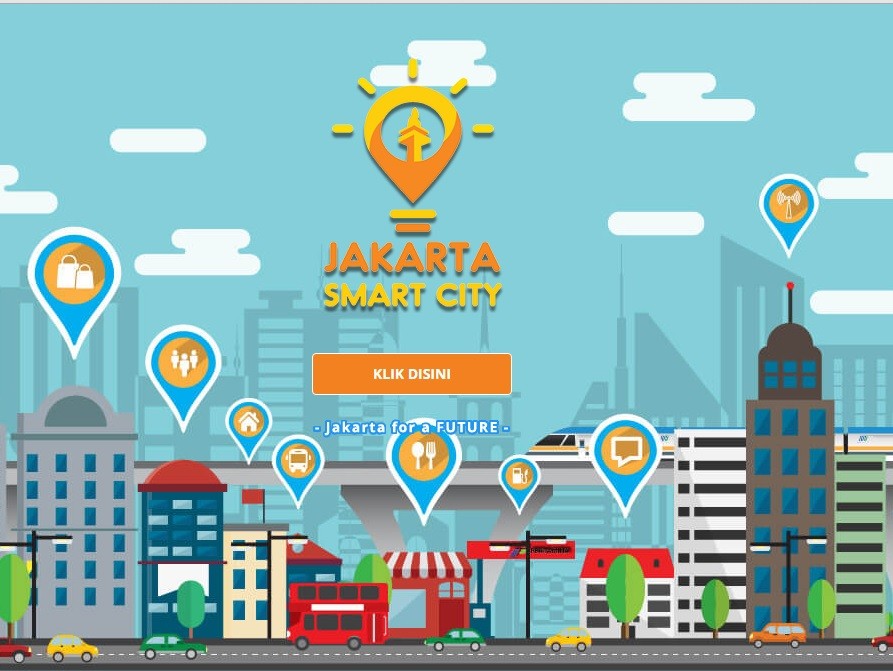Adopting ICT: Painfully slow at govt offices
ICT infrastructure in Indonesia has somewhat improved and the government has also shown strong commitment by investing huge amounts of money in e-government, which in 2014 reached Rp 36 trillion (US$2.8 billion). Unfortunately, the progress is still very far from ideal. The answer to this problem may lie in reinventing business processes.
Change Size
 The Jakarta administration applies smart city concept which allows residents to report and find information on any public facilities in the capital. Jakarta Governor Basuki "Ahok" Tjahaja Purnama regulates city officials up to local neighborhood chiefs to follow up complaints from residents through mobile application called Qlue. (Photo taken from smartcity.jakarta.go.id/-)
The Jakarta administration applies smart city concept which allows residents to report and find information on any public facilities in the capital. Jakarta Governor Basuki "Ahok" Tjahaja Purnama regulates city officials up to local neighborhood chiefs to follow up complaints from residents through mobile application called Qlue. (Photo taken from smartcity.jakarta.go.id/-)
I
t was Ramadhan 2006 and I was working on a documentary project in Nias, North Sumatra, for a UN body. I was interviewing the regent to get some sound bites from him on an internet connectivity project after the massive earthquake, with the aim of improving communication and coordination between the regency government and its partners.
I asked him, “How has the project improved the work in your office?” His answer was, “It is useless!” He re-affirmed that the project was a complete waste of time and energy. The regency was a tedious six-hour drive from the island’s main access in the town of Gunung Sitoli, itself an hour-and-a-half’s hours flight from Medan, the capital of North Sumatra.
I continued, “Won’t it be easier to communicate with your colleagues in Gunung Sitoli or Medan as you now have internet access?”. His answer was a plain “No.”
Fast-forward to Ramadhan 2016 in Jakarta where I am now working on projects with central government bodies where unfortunately, the internet of things is definitely not a thing just yet.
Despite its introduction in the late 1990s in Indonesia and with currently 88 million active internet users, it is still very hard to communicate with our government counterparts via internet.
This is true even for daily office correspondence, such as asking for feedback on minutes of a meeting, reviewing a draft of a letter or simply confirming a meeting invitation.
While most officials are now familiar with the internet — some are in fact avid social media users — unfortunately, the technologies have not been smartly deployed. Everything is still done conventionally via direct meetings, which has become increasingly hard given Jakarta’s traffic.
When we addressed our concerns over the delayed responses, my government partners often reasoned that our project was not the only project they managed.
This is true of almost any office, and this is precisely why they should optimize information technology, as it would save them a tremendous amount of time. And especially with shortened working hours during Ramadhan, email correspondence should be the government’s best friend.
The issue has been clearly addressed in Indonesia’s short-term e-government roadmap (2016– 2019), which lists the implementation of e-offices at inter-agency leadership level to promote real-time and paperless information sharing as its “quick wins” in 2016. This includes dissemination of updates and follow-ups, minutes of meetings and so forth.
If we are to compare these “quick wins” with what the private sector in Indonesia has done, our government lags behind almost 20 years. In the early 2000s, my office at an oil and gas company already used the intranet not only to exchange emails, but also to review documents, provide e-training and approve certain fund issuances and expenses using a delegation of authority system. All this led to increased efficiency and eased coordination and communication between our two field offices and our headquarters in Jakarta.
Although we found out later that the above regent’s uncongenial remarks 10 years ago were caused by him feeling “left out” of the post-earthquake work plan and implementation, his comments still reflect government bodies that remain oblivious of how to make use of information technology. There has been little improvement among our government offices, apparently even in the capital.
Governments are not leaders in technology, and it takes large sums of cash to meet equipment needs and staff-training requirements, as well as to ensure the safety of confidential information. Yet the public demands transparency and partners need timely responses from their government counterparts to get things done.
ICT infrastructure in Indonesia has somewhat improved and the government has also shown strong commitment by investing huge amounts of money in e-government, which in 2014 reached Rp 36 trillion (US$2.8 billion). Unfortunately, the progress is still very far from ideal. The answer to this problem may lie in reinventing business processes.
For this, government bodies can easily adopt numerous and obtainable standard procedures from the private sector and/or public institutions from more advanced countries on the what, how, when and by whom certain information and communication can be released and executed.
Because it is high time for the government to adapt to the changing environment and adopt relevant technology in order to find new ways of efficiency.
***
The writer is a communications and media specialist in Jakarta.
---------------
We are looking for information, opinions, and in-depth analysis from experts or scholars in a variety of fields. We choose articles based on facts or opinions about general news, as well as quality analysis and commentary about Indonesia or international events. Send your piece to community@jakpost.com.








